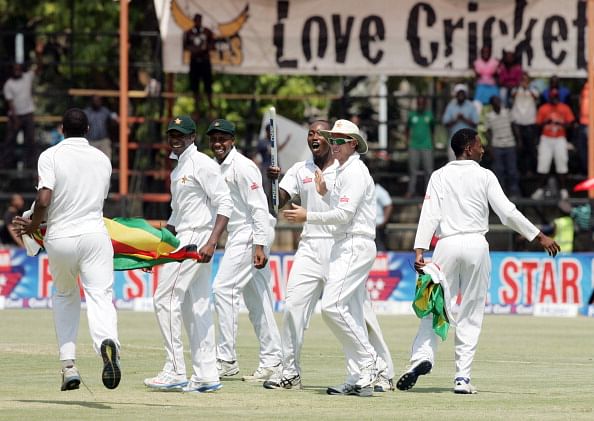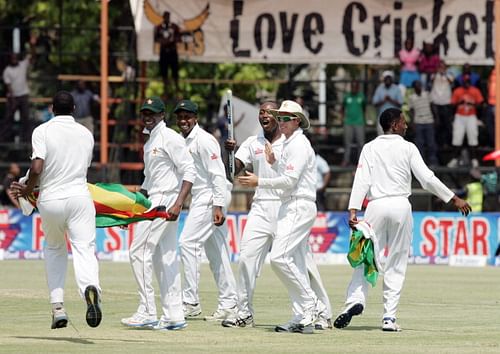
The turmoils of Zimbabwe Cricket: should the ICC help out?

Zimbabwe players celebrate victory over Pakistan on September 14, 2013 during the fifth day of the second Test at the Harare Sports Club. (Getty Images)
A desperate attempt to steal a non-existent single to allow Misbah-Ul-Haq to retain strike, led to the inevitable run-out of Rahat Ali. It was a typical run-out dismissal involving a tail-ender; reeking of indecision and lack of trust.
And that triggered wild celebrations from the young Zimbabwean side. The hosts had, after all, registered its first Test win against a team other than Bangladesh in over 12 years. The win was even more special as it came amidst adverse circumstances.
The players and the board were at war due to non-payment of salaries and the newly-formed players’ union had threatened to boycott the series. It was only after several backroom discussions and negotiations that the players agreed to take the field.
The victory was appreciated all over the cricketing world, and the Zimbabwean cricketers were rightly hailed for putting up a brilliant show despite the financial crisis. But as the euphoria of the historic win sunk in, it dawned upon everyone concerned that the current season, for all practical purpose, is over for Zimbabwe.
The Sri Lankan team was scheduled to tour the African nation in October to play two Tests, three ODIs and two twenty20 internationals, but the cash-strapped Zimbabwe Cricket wrote to its Lankan counterpart, asking to postpone the tour.
After incurring losses from the Pakistan series, the board was simply not in a position to host another tour. In fact, such is the paucity of funds for ZC that it recently had to let go the bowling coach Heath Streak and part ways with youngsters Craig Ervine and Kyle Jarvis, who left the system for greener pastures elsewhere.
The most frustrating element in the whole saga is the fact that financial constraints have become a recurring issue for ZC. The establishment was forced to withdraw from the unprofitable Test arena for almost six years but were allowed to remain a full member of ICC, making them eligible to enjoy monetary benefits from the ICC. Despite that the association finds itself in debts of $18 million and seems caught in a viscous tangle from which it is unable to wriggle itself out.
On their return to the Test fold after the self-imposed exile, Zimbabwe showed that they still have quality within their ranks as two of their elder statesmen, Hamilton Masakadza and Brendan Taylor, notched up impressive centuries to help the side register a comprehensive 130-run win over Bangladesh.
The team, however, was left starving for action at the highest level, and it has since been a stop-start affair. They had to be content with one-off Tests against Pakistan and New Zealand before being left in the lurch again in 2012. They had to endure a 12-month period of idleness during which the only international action they had was two twenty20 games in Hambantota during the course of the last twenty20 World Cup in Sri Lanka.